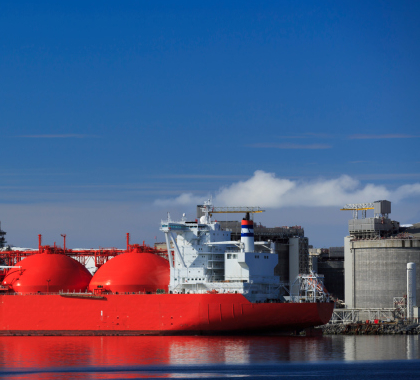Construction can now begin on a massive $10 billion liquefied natural gas (LNG) project in Jefferson County, Texas, after the Federal Energy Regulatory Commission (FERC) granted a permit to Golden Pass Products.
Located at a site known as Sabine Pass on Texas’ northern Gulf Coast, the project will include three liquefaction trains; gas treatment facilities; an on-site, self-generating power plant; and an expansion of the company’s pipeline system. The expansive operation will have a capacity to export 15.6 million metric tons of LNG per year to international markets. Golden Pass is jointly owned by Exxon Mobil and Qatar Petroleum.
In addition to the LNG export terminal, the project includes a pipeline expansion in Louisiana and Texas that will have the capacity to move two billion cubic feet of natural gas per day to the export facility.
FERC’s approval took more than three years, concluding in late December 2016. The project has one final hurdle to clear before construction can begin: approval from the U.S. Department of Energy to export LNG to non-Free Trade Agreement nations.
Construction of the facility could take up to five years after DOE signs off on the project. Once in operation, the facility will provide 200 full-time jobs and will help create an additional 3,600 jobs, the company estimates.
Wetlands Mitigation
As with any large-scale industrial project, the Sabine Pass facility had its share of environmental bridges to cross, but none proved serious. Among the concerns raised in FERC’s July 2016 Environmental Impact Statement (EIS) was the project would affect 388 acres of wetlands. To mitigate the wetlands loss, the company agreed to create an area of nearly twice as much wetlands at the nearby J.D. Murphree Wildlife Management Refuge.
FERC’s EIS ultimately determined “the environmental impacts of the Export Terminal Project are not expected to be significant and can be further mitigated by appropriate measures.”
LNG Terminal Role Reversal
The Sabine Pass project, the ninth LNG export terminal to receive FERC approval, is located on a site originally developed by Golden Pass as an LNG import terminal. That was before the shale revolution in the United States transformed global energy production.
Advances in hydraulic fracturing, commonly called “fracking,” horizontal drilling, and seismic imaging have enabled drillers to reach vast stores of oil and gas in shale formations, making the United States the world’s largest producer of natural gas and the fastest-growing producer of oil. As a result, coastal sites targeted for LNG import facilities are being reverse-engineered to create LNG export terminals.
‘A Game-Changing Development’
James Taylor, president of the Spark of Freedom Foundation, says LNG terminals will be a boon for the U.S. economy and the environment.
“American natural gas exports are a game-changing development for the global environment, the American economy, and the safety and security of America’s allies,” Taylor said. “Natural gas power plants produce very few emissions, which will allow Asian and European nations struggling with air quality to improve the air they breathe.
“The money flowing in from these countries will boost the American economy,” Taylor said. “Just as important, our allies will be able to purchase natural gas from us rather than remaining dependent on Russia and other potentially hostile nations.”
Costly Delay
Taylor says FERC’s three-year delay in approving the Sabine Pass facility cost jobs and economic growth.
“American companies shouldn’t be tied up in federal bureaucracy for three years when they are ready to create good-paying jobs and invigorate the economy,” Taylor said. “We also need LNG export facilities on the West Coast to better service natural gas demand in Asia. Federal, state, and local officials have blocked the construction of West Coast export facilities, which is surrendering the large and growing Asian market to our competitors.”
Ron Arnold, vice president of the Center for the Defense of Free Enterprise, points out the 1970 National Environmental Policy Act, which requires Environmental Impact Statements for major projects, has long been used by environmental groups and federal bureaucrats to block or stall job-producing projects like the Sabine Pass LNG facility.
“The National Environmental Policy Act mandates ‘a national policy which will encourage productive and enjoyable harmony between man and his environment,'” Arnold said. “It’s long past time regulators honored the ‘productive’ in the statement of purpose.”
Bonner R. Cohen, Ph. D. ([email protected]) is a senior fellow at the National Center for Public Policy Research.





